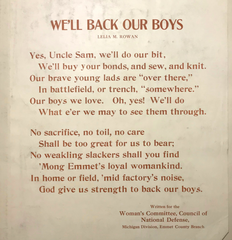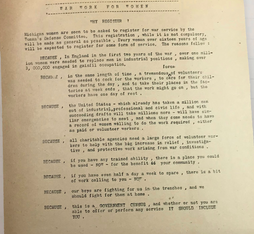Woman Suffrage
Women's Scrapbook
During World War I, women across the country were asked to register for service and work they were trained to do. This scrapbook appears to have begun as a census of local women, with hand-drawn maps outlining each section of the city and listing the women at each address. In later sections of the scrapbook, we see that it becomes part of the Woman Suffrage movement, including flyers explaining why women should have the right to vote and bulletins from the National American Woman Suffrage Association. The scrapbook was created by pasting over pages from an Occidental Hotel guest book.
Part I Part II
Emmet County Woman Suffrage Association
Biography research by Meryl Hankey; written by Sally Shearer Smith
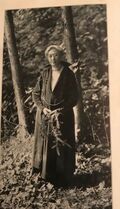
Emma Baker: Poet
Emma Baker was a local suffragist with the Emmet County Equal Suffrage Association. Emma was a Petoskey resident and Bay View member living on Grove Street in Petoskey in the winter months and living in her Bay View cottage during the summer.
Emma was a writer, poet, and served as secretary for the Emmet County Suffrage League (another name for the Emmet County Suffrage Association.) She was also known for her efforts for the local option and prohibition. In addition, Emma was highly active in the church as well. The subtitle beneath her obituary announcement read, “Was One of the Best-Known Leaders in Church and Social Affairs in City and Region.”
Emma Baker was a local suffragist with the Emmet County Equal Suffrage Association. Emma was a Petoskey resident and Bay View member living on Grove Street in Petoskey in the winter months and living in her Bay View cottage during the summer.
Emma was a writer, poet, and served as secretary for the Emmet County Suffrage League (another name for the Emmet County Suffrage Association.) She was also known for her efforts for the local option and prohibition. In addition, Emma was highly active in the church as well. The subtitle beneath her obituary announcement read, “Was One of the Best-Known Leaders in Church and Social Affairs in City and Region.”
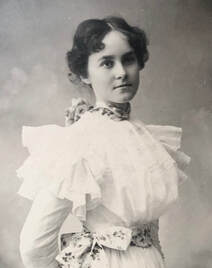
Margaret Hankey Curtis (1878-1950): Community Leader
Throughout her life Margaret Curtis was active in several organizations in the Petoskey community. As a member of First Presbyterian Church of Petoskey, Margaret was continually active in the church woman’s circles and sang in the choir. She volunteered countless hours on hospital auxiliary work and was involved in the library and several charitable organizations. Giving of her time and talent to the community was of great importance to Margaret. She was also one of the directors of the First National Bank, a role not common for women at that time.
Margaret came from a family whose philanthropic legacy helped create the Petoskey we know today. As an example, Margaret and her husband owned four lots on State Street. They deeded those four lots to the government to build the Petoskey Post Office currently located there.
A member of the Emmet County Suffrage League since 1912, Margaret served as chairman of the Literature Committee and lived on Bay Street in Petoskey.
Throughout her life Margaret Curtis was active in several organizations in the Petoskey community. As a member of First Presbyterian Church of Petoskey, Margaret was continually active in the church woman’s circles and sang in the choir. She volunteered countless hours on hospital auxiliary work and was involved in the library and several charitable organizations. Giving of her time and talent to the community was of great importance to Margaret. She was also one of the directors of the First National Bank, a role not common for women at that time.
Margaret came from a family whose philanthropic legacy helped create the Petoskey we know today. As an example, Margaret and her husband owned four lots on State Street. They deeded those four lots to the government to build the Petoskey Post Office currently located there.
A member of the Emmet County Suffrage League since 1912, Margaret served as chairman of the Literature Committee and lived on Bay Street in Petoskey.
Agnes Stewart Cushman: Nurse and Businesswoman
Agnes Stewart Cushman emigrated from Scotland in1887 and became a naturalized U.S. citizen. She was trained as a nurse and was working as such in 1910. She was also a “rooming house proprietor” renting rooms out of her home. Agnes was a member of the Methodist Aid Society and made contributions to the Community Room Fund.
She was an active member of the Women’s Christian Temperance Union (W.C.T.U.) and represented the First Presbyterian Church of Petoskey in that organization. Agnes served as treasurer of the Emmet County Equal Suffrage League and lived on State Street in Petoskey.
Agnes Stewart Cushman emigrated from Scotland in1887 and became a naturalized U.S. citizen. She was trained as a nurse and was working as such in 1910. She was also a “rooming house proprietor” renting rooms out of her home. Agnes was a member of the Methodist Aid Society and made contributions to the Community Room Fund.
She was an active member of the Women’s Christian Temperance Union (W.C.T.U.) and represented the First Presbyterian Church of Petoskey in that organization. Agnes served as treasurer of the Emmet County Equal Suffrage League and lived on State Street in Petoskey.
Edith Ditto (1876-1970): Genial Host in Petoskey and Bay View
Edith Jennings Ditto was born in Ontario, Canada. Her family moved to Petoskey when she was two-years old. She married Charles Ditto in 1896 who eventually became mayor of Petoskey in 1916. In 1918 Edith and Charles moved to Bay View where Mr. Ditto became the Superintendent of Grounds and where they would live year-round. Working beside her husband in his positions as mayor and then superintendent, Edith became more than a hostess. She was involved in inviting dignitaries and speakers to the city, finding lodging for them, securing their travel plans, and recruiting appropriate hosts. In Bay View she did the same for performers, lecturers, and ministers, meanwhile attending to the needs of the cottagers. She served Bay View in that capacity for 29 years.
Edith was an active member of the Emmet County Equal Suffrage Association, the United Methodist Church and its societies, Order of the Eastern Star, and was also a member of the Little Traverse Historical Society, and the Humane Society.
Edith Jennings Ditto was born in Ontario, Canada. Her family moved to Petoskey when she was two-years old. She married Charles Ditto in 1896 who eventually became mayor of Petoskey in 1916. In 1918 Edith and Charles moved to Bay View where Mr. Ditto became the Superintendent of Grounds and where they would live year-round. Working beside her husband in his positions as mayor and then superintendent, Edith became more than a hostess. She was involved in inviting dignitaries and speakers to the city, finding lodging for them, securing their travel plans, and recruiting appropriate hosts. In Bay View she did the same for performers, lecturers, and ministers, meanwhile attending to the needs of the cottagers. She served Bay View in that capacity for 29 years.
Edith was an active member of the Emmet County Equal Suffrage Association, the United Methodist Church and its societies, Order of the Eastern Star, and was also a member of the Little Traverse Historical Society, and the Humane Society.
Mary Elizabeth “Minnie” Gilbert (1867-1948): A Founder of Two Local Organizations and Election Board Supervisor
On the front page of the June 25, 1912 edition of The Petoskey Evening News, there appears an article titled “WOMEN ORGANIZE FOR EQUAL RIGHTS, Men Took Part in Monday Night Session.” Yes, men were there including a judge, three ministers, and supportive husbands. Mrs. Huntley Russell from Grand Rapids, vice-president of the state equal suffrage association addressed the audience on the issue of the voting rights for women. As a result of this historic meeting held in the First Presbyterian Church in Petoskey, a county committee was formed under the auspices of the Petoskey Federation of Women’s Clubs, and officers were quickly elected; and, Minnie Gilbert was elected as chairman of the Speaker’s Committee of this newly formed Emmet County Suffrage League. Later she serves as its secretary. The League eventually becomes the Emmet County Equal Suffrage Association. Minnie also served as secretary of the Women’s Christian Temperance Union (W.C.T.U.)
The Emmet County Equal Suffrage Association was not the only organization in which Minnie was a founder. On May 5, 1911, The Petoskey Evening News reported, “Alumni Association Formed.” The article states that Minnie, a University of Michigan graduate, along with three male alumni, was credited with establishing the Emmet County Alumni Association of the University of Michigan. Each in the group of four held an office in this newly formed organization. Minnie served as secretary. The then president of the University of Michigan, President Hutchins, attended the organizational meeting.
There is no question about Minnie’s leadership skills, as she exercised them in yet another area of life in Petoskey. The March 16, 1920, edition of the same Petoskey newspaper announced who will serve as “Supervisors” on the election boards “of the presidential primary election in Petoskey in April.” She served on the election board with two other men for Petoskey’s First Ward. Minnie’s residence was on Kalamazoo Street which, of course, is in the First ward.
On the front page of the June 25, 1912 edition of The Petoskey Evening News, there appears an article titled “WOMEN ORGANIZE FOR EQUAL RIGHTS, Men Took Part in Monday Night Session.” Yes, men were there including a judge, three ministers, and supportive husbands. Mrs. Huntley Russell from Grand Rapids, vice-president of the state equal suffrage association addressed the audience on the issue of the voting rights for women. As a result of this historic meeting held in the First Presbyterian Church in Petoskey, a county committee was formed under the auspices of the Petoskey Federation of Women’s Clubs, and officers were quickly elected; and, Minnie Gilbert was elected as chairman of the Speaker’s Committee of this newly formed Emmet County Suffrage League. Later she serves as its secretary. The League eventually becomes the Emmet County Equal Suffrage Association. Minnie also served as secretary of the Women’s Christian Temperance Union (W.C.T.U.)
The Emmet County Equal Suffrage Association was not the only organization in which Minnie was a founder. On May 5, 1911, The Petoskey Evening News reported, “Alumni Association Formed.” The article states that Minnie, a University of Michigan graduate, along with three male alumni, was credited with establishing the Emmet County Alumni Association of the University of Michigan. Each in the group of four held an office in this newly formed organization. Minnie served as secretary. The then president of the University of Michigan, President Hutchins, attended the organizational meeting.
There is no question about Minnie’s leadership skills, as she exercised them in yet another area of life in Petoskey. The March 16, 1920, edition of the same Petoskey newspaper announced who will serve as “Supervisors” on the election boards “of the presidential primary election in Petoskey in April.” She served on the election board with two other men for Petoskey’s First Ward. Minnie’s residence was on Kalamazoo Street which, of course, is in the First ward.
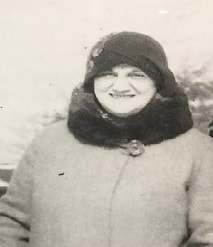
Zilla Goldstein (1874-1946): Businesswoman, Local and District Suffrage Leader
Zilla von Wunderlich was born in Chicago, Illinois in 1874. She married Cassius Goldstein in 1896. Zilla and her daughter Gertrude moved to Petoskey in 1911 where she resided as a businesswoman, Suffrage leader, and member of several local women’s clubs. Zilla’s older sister was Suffragist Minnie Rosenthal.
Zilla worked for her brother-in-law Alick Rosenthal and served as vice-president of S. Rosenthal & Sons for 17 years. Years later after studying for two months in Chicago to learn “the latest in knitting, needle point, and fancy work,” Zilla returned to Petoskey and opened “The Knitting Shop” in the Rosenthal’s store. The Knitting Shop operated for 20 years. During that same time, Zilla demonstrated her writing skills as she worked as “fashion and feature writer for the Northern Michigan Review.” (Northern Michigan Review, Nov. 21, 1946.)
Her volunteer work in the community included recruiting area boys and men for service in World War I. On August 8, 1918, The Petoskey Evening News reported a story titled “GIRL RECRUITERS OBTAIN 30 NAMES.” An all-women recruiting Corps accompanied by Zilla Goldstein and several other women from the community including her daughter, Irene Goldstein, recruited 30 men in Harbor Springs for service in World War I. The article also stated that the all-women Recruiting Corps would be holding a first-time rally in Petoskey for the same purpose the following Saturday.
Like her older sister Minnie, Zilla was involved in the Temple B’Nai Israel in Petoskey. She was chairman of the Memorial and Happy Day Fund for the B’Nai Israel congregation and an active member of the Petoskey Temple Sisterhood. Zilla and Minnie traveled to state and national conventions for the Jewish Temple Sisterhood organization.
Zilla’s efforts in supporting the Woman’s Suffrage Campaign are significant. The headlines of The Petoskey Evening News, February 21, 1917, read WOMEN WHO LEAD NATION-WIDE FIGHT FOR WOMAN SUFFRAGE. The article includes photos of the national and state leaders and two columns are devoted to Zilla Goldstein’s “MICHIGAN WOMAN’S UP TO DATE” report. Also, included in her column are letters addressed to her from men in the local community supporting the local Suffrage movement including one from Henry S. Sweeny, husband of local suffragist Lulu Sweeny. In yet another article titled NAME CHAIRMEN FOR SUFFRAGE in the Evening News, May 17, 1918 edition, Zilla is named 11th Congressional District Chairman for the Suffrage Association and Grace Jessop is named Emmet County Chairman. The article announces the affiliation of the local group with the state organization. In the June 6, 1916 edition on page 2, “Tea Table Talk,” Zilla and her sister Minnie are mentioned as having traveled to the Suffrage National Convention in Chicago. Both women become active members of the Emmet County Suffrage Association.
Zilla lived in the Rosenthal home on Michigan Street in Petoskey with Minnie and Alick Rosenthal and other family members.
Zilla von Wunderlich was born in Chicago, Illinois in 1874. She married Cassius Goldstein in 1896. Zilla and her daughter Gertrude moved to Petoskey in 1911 where she resided as a businesswoman, Suffrage leader, and member of several local women’s clubs. Zilla’s older sister was Suffragist Minnie Rosenthal.
Zilla worked for her brother-in-law Alick Rosenthal and served as vice-president of S. Rosenthal & Sons for 17 years. Years later after studying for two months in Chicago to learn “the latest in knitting, needle point, and fancy work,” Zilla returned to Petoskey and opened “The Knitting Shop” in the Rosenthal’s store. The Knitting Shop operated for 20 years. During that same time, Zilla demonstrated her writing skills as she worked as “fashion and feature writer for the Northern Michigan Review.” (Northern Michigan Review, Nov. 21, 1946.)
Her volunteer work in the community included recruiting area boys and men for service in World War I. On August 8, 1918, The Petoskey Evening News reported a story titled “GIRL RECRUITERS OBTAIN 30 NAMES.” An all-women recruiting Corps accompanied by Zilla Goldstein and several other women from the community including her daughter, Irene Goldstein, recruited 30 men in Harbor Springs for service in World War I. The article also stated that the all-women Recruiting Corps would be holding a first-time rally in Petoskey for the same purpose the following Saturday.
Like her older sister Minnie, Zilla was involved in the Temple B’Nai Israel in Petoskey. She was chairman of the Memorial and Happy Day Fund for the B’Nai Israel congregation and an active member of the Petoskey Temple Sisterhood. Zilla and Minnie traveled to state and national conventions for the Jewish Temple Sisterhood organization.
Zilla’s efforts in supporting the Woman’s Suffrage Campaign are significant. The headlines of The Petoskey Evening News, February 21, 1917, read WOMEN WHO LEAD NATION-WIDE FIGHT FOR WOMAN SUFFRAGE. The article includes photos of the national and state leaders and two columns are devoted to Zilla Goldstein’s “MICHIGAN WOMAN’S UP TO DATE” report. Also, included in her column are letters addressed to her from men in the local community supporting the local Suffrage movement including one from Henry S. Sweeny, husband of local suffragist Lulu Sweeny. In yet another article titled NAME CHAIRMEN FOR SUFFRAGE in the Evening News, May 17, 1918 edition, Zilla is named 11th Congressional District Chairman for the Suffrage Association and Grace Jessop is named Emmet County Chairman. The article announces the affiliation of the local group with the state organization. In the June 6, 1916 edition on page 2, “Tea Table Talk,” Zilla and her sister Minnie are mentioned as having traveled to the Suffrage National Convention in Chicago. Both women become active members of the Emmet County Suffrage Association.
Zilla lived in the Rosenthal home on Michigan Street in Petoskey with Minnie and Alick Rosenthal and other family members.
Jessie Grosenbaugh: Community Activist, Public Servant, and Program Speaker
Jessie Grosenbaugh was involved in many aspects of the Petoskey community. Her resume of volunteer work and leadership responsibilities is extensive. She served as president of the Petoskey Federation of Women’s Clubs, was selected President of the Emmet County Suffrage Committee at the organizational meeting on Monday, June 24, 1912; and, then, became President of the Emmet County Suffrage League. In the meeting announcements of several editions of The Petoskey Evening News, Jessie is listed as program chairman or speaker, or both for various organization’s meetings. In 1906, She founded the Monday Study Club “to advance the literary and cultural needs of the people of this area.” She provided speakers and led several programs for that club and the Women’s Temperance Union (W.C.T.U.) Jessie was assigned a county-wide responsibility when she was appointed by the governor as Chairman of the Emmet County Food Conservation Committee. The announcement of this important appointment came “By Special Wire to Evening News.” Another important appointment came on June 17,1919, when Jessie and Norman Wells, both of Petoskey, were appointed by the Red Cross to open an unemployment bureau in the city “to assist return soldiers and sailors in securing positions.” Jessie was serving as Secretary of the local Red Cross at the time.
In the July 19,1912, issue of the Daily Resorter and Petoskey News, the title of a lengthy article reads “NEITHER IDIOTS NOR IMBECILES,” ONE REASON WHY WOMEN SHOULD VOTE, Enthusiastic Meeting at W.C.T.U, Held at Bay View, With Women Suffrage as the Subject---Much Interest.” This meeting was planned and run by Jessie Grosenbaugh, who after welcoming the 100 ladies who were present, opened the meeting addressing the audience with one question, “Ladies, why do we wish to vote?” The rest of the meeting appeared to function as an audience forum where various women answered the question giving their reasons for wanting a vote and/or citing examples of what other groups were doing across the country. The meeting closed with supper and a social hour.
Jessie was an active member of the First Episcopal Methodist Church and lived on Michigan Street in Petoskey in the winter, and sometimes leased a cottage in Bay View in the summer.
Jessie Grosenbaugh was involved in many aspects of the Petoskey community. Her resume of volunteer work and leadership responsibilities is extensive. She served as president of the Petoskey Federation of Women’s Clubs, was selected President of the Emmet County Suffrage Committee at the organizational meeting on Monday, June 24, 1912; and, then, became President of the Emmet County Suffrage League. In the meeting announcements of several editions of The Petoskey Evening News, Jessie is listed as program chairman or speaker, or both for various organization’s meetings. In 1906, She founded the Monday Study Club “to advance the literary and cultural needs of the people of this area.” She provided speakers and led several programs for that club and the Women’s Temperance Union (W.C.T.U.) Jessie was assigned a county-wide responsibility when she was appointed by the governor as Chairman of the Emmet County Food Conservation Committee. The announcement of this important appointment came “By Special Wire to Evening News.” Another important appointment came on June 17,1919, when Jessie and Norman Wells, both of Petoskey, were appointed by the Red Cross to open an unemployment bureau in the city “to assist return soldiers and sailors in securing positions.” Jessie was serving as Secretary of the local Red Cross at the time.
In the July 19,1912, issue of the Daily Resorter and Petoskey News, the title of a lengthy article reads “NEITHER IDIOTS NOR IMBECILES,” ONE REASON WHY WOMEN SHOULD VOTE, Enthusiastic Meeting at W.C.T.U, Held at Bay View, With Women Suffrage as the Subject---Much Interest.” This meeting was planned and run by Jessie Grosenbaugh, who after welcoming the 100 ladies who were present, opened the meeting addressing the audience with one question, “Ladies, why do we wish to vote?” The rest of the meeting appeared to function as an audience forum where various women answered the question giving their reasons for wanting a vote and/or citing examples of what other groups were doing across the country. The meeting closed with supper and a social hour.
Jessie was an active member of the First Episcopal Methodist Church and lived on Michigan Street in Petoskey in the winter, and sometimes leased a cottage in Bay View in the summer.
Eva House (1866-1944): Apartment Manager
Eva House was born in Orangeville, Michigan. After she married Seth W. House, they came to Petoskey and lived here for 10 years but then left for life in southern Texas. Eva and Seth returned in 1917 making Petoskey their permanent home.
Eva managed La Cross Apartments in Petoskey for many years. During that time, she was active in several organizations including the Past Matrons, Order of the Eastern Star in which she had held most of the offices. In addition, she was active in the Woman’s Christian Temperance Union (W.C.T.U.,) the First Presbyterian Church of Petoskey, and the Emmet County Suffrage Association.
Eva lived on Mitchell Street in Petoskey.
Eva House was born in Orangeville, Michigan. After she married Seth W. House, they came to Petoskey and lived here for 10 years but then left for life in southern Texas. Eva and Seth returned in 1917 making Petoskey their permanent home.
Eva managed La Cross Apartments in Petoskey for many years. During that time, she was active in several organizations including the Past Matrons, Order of the Eastern Star in which she had held most of the offices. In addition, she was active in the Woman’s Christian Temperance Union (W.C.T.U.,) the First Presbyterian Church of Petoskey, and the Emmet County Suffrage Association.
Eva lived on Mitchell Street in Petoskey.
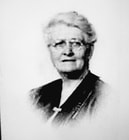
Grace Waldo Jessop (1870-1949): Educator, PTA Organizer, and Suffrage Leader
Grace Jessop was well known in Petoskey as she taught for 44 years in the Petoskey School system. Her career as an educator started in Fort Wayne, Indiana, where she taught for six years and studied Greek and Latin at Concordia College (1861-1957) located in Fort Wayne at that time. In 1903, after the death of her husband, she moved to Petoskey. During her years in Petoskey, she also attended Ypsilanti and Kalamazoo colleges, but remained active in the community as well. Grace was a leader in the State PTA and helped organize the PTA in Northern Michigan.
Grace’s other involvements in the community included the Art Study Club and the library board. She was a member of the library board and was serving as president at the time of her death. In memorial to Grace and her work, the library closed from 3:00-4:00 the day of her funeral.
Northern Michigan historian, Rick Wiles, acknowledges Grace Jessop’s role in the suffrage movement in his article, “Suffragettes” in the Mackinac Journal, Magazine of the Straits and EUP. Wiles uses a quote from the May 16,1918 edition of The Petoskey Evening News which identifies “Mrs. Zilla Goldstein and Mrs. Grace Jessop” as “Petoskey’s suffrage leaders.”
Grace was a member of the National American Suffrage Association and the Chairman of Emmet County Suffrage after Zilla Goldstein became District Chairman.
Grace was a member of the First Presbyterian Church of Petoskey and lived on Michigan Street.
Grace Jessop was well known in Petoskey as she taught for 44 years in the Petoskey School system. Her career as an educator started in Fort Wayne, Indiana, where she taught for six years and studied Greek and Latin at Concordia College (1861-1957) located in Fort Wayne at that time. In 1903, after the death of her husband, she moved to Petoskey. During her years in Petoskey, she also attended Ypsilanti and Kalamazoo colleges, but remained active in the community as well. Grace was a leader in the State PTA and helped organize the PTA in Northern Michigan.
Grace’s other involvements in the community included the Art Study Club and the library board. She was a member of the library board and was serving as president at the time of her death. In memorial to Grace and her work, the library closed from 3:00-4:00 the day of her funeral.
Northern Michigan historian, Rick Wiles, acknowledges Grace Jessop’s role in the suffrage movement in his article, “Suffragettes” in the Mackinac Journal, Magazine of the Straits and EUP. Wiles uses a quote from the May 16,1918 edition of The Petoskey Evening News which identifies “Mrs. Zilla Goldstein and Mrs. Grace Jessop” as “Petoskey’s suffrage leaders.”
Grace was a member of the National American Suffrage Association and the Chairman of Emmet County Suffrage after Zilla Goldstein became District Chairman.
Grace was a member of the First Presbyterian Church of Petoskey and lived on Michigan Street.
Minnie Shippey Klise (1856-1918): Educator, Accountant, Civic Leader
Minnie Shippey was born in Jackson, Michigan in 1856. Her great-grandfather fought in the Revolutionary War and her grandfather fought in the war with Mexico. Her parents were teachers and originally from upper New York State. Minnie followed in their footsteps becoming a teacher and taught for ten years. During that time, Minnie married a young lumberman, Albert B. Klise. The couple lived in Sullivan, Michigan for several years and then moved to Petoskey.
Shortly after moving to Petoskey, Minnie’s husband established A.B. Klise Lumber Company. The former location of the Lumber company is the area off Emmet Street at Sheridan and the G.H. & I. railroad where the tracks remain today. At the time of the organization of the company, Minnie became secretary. Her duties in this position included managing the finances. Her obituary states she was an “expert accountant” and she “regularly audited and checked all the books.”
As busy as Minnie was with her responsibilities at the lumber company, she still found time to participate in civic interests. Minnie was an officer in the Federation of Women’s Clubs, member of the Art Club, the Women’s Club, and served two years as a regent of the Daughters of the American Revolution (D.A.R.) and was a member of the Pe-to-Se-Ga Chapter. She was a member of the Beulah Chapter, No. 03, Order of the Eastern Star, and Queen Esther Shrine, No. 15. O. W. S. of J.
Minnie was present at the June 24, 1912 organizational meeting of the Emmet County Suffrage League and was elected Vice-Chairman.
Minnie Shippey was born in Jackson, Michigan in 1856. Her great-grandfather fought in the Revolutionary War and her grandfather fought in the war with Mexico. Her parents were teachers and originally from upper New York State. Minnie followed in their footsteps becoming a teacher and taught for ten years. During that time, Minnie married a young lumberman, Albert B. Klise. The couple lived in Sullivan, Michigan for several years and then moved to Petoskey.
Shortly after moving to Petoskey, Minnie’s husband established A.B. Klise Lumber Company. The former location of the Lumber company is the area off Emmet Street at Sheridan and the G.H. & I. railroad where the tracks remain today. At the time of the organization of the company, Minnie became secretary. Her duties in this position included managing the finances. Her obituary states she was an “expert accountant” and she “regularly audited and checked all the books.”
As busy as Minnie was with her responsibilities at the lumber company, she still found time to participate in civic interests. Minnie was an officer in the Federation of Women’s Clubs, member of the Art Club, the Women’s Club, and served two years as a regent of the Daughters of the American Revolution (D.A.R.) and was a member of the Pe-to-Se-Ga Chapter. She was a member of the Beulah Chapter, No. 03, Order of the Eastern Star, and Queen Esther Shrine, No. 15. O. W. S. of J.
Minnie was present at the June 24, 1912 organizational meeting of the Emmet County Suffrage League and was elected Vice-Chairman.
Frances Webb Oldham (1866-1948): Active in Community Organizations
Frances Oldham came to Petoskey from the village of Casnovia, Michigan, when she was a young girl and lived in this community for over 50 years. During that time, she was an active member of various community organizations.
Frances was a charter member of the local Order of the Eastern Star (O.E.S.,) which is an appendant organization of the Masonic Order. The organization is open to men and women who work for the better good and on” projects that benefit mankind.” She was active in the Women’s Relief Corps, an auxiliary to the Grand Army of the Republic (GAR,) which among other goals strived to advocate for assistance for Civil War veterans. During World War I, she worked on the Food Conservation Campaign. Frances was a member of the women’s circles of the First Presbyterian Church in Petoskey.
Frances was an active member of the Emmet County Equal Suffrage Association; and, in 1917, she hosted the annual meeting of this organization at her home on State Street in Petoskey.
Frances Oldham came to Petoskey from the village of Casnovia, Michigan, when she was a young girl and lived in this community for over 50 years. During that time, she was an active member of various community organizations.
Frances was a charter member of the local Order of the Eastern Star (O.E.S.,) which is an appendant organization of the Masonic Order. The organization is open to men and women who work for the better good and on” projects that benefit mankind.” She was active in the Women’s Relief Corps, an auxiliary to the Grand Army of the Republic (GAR,) which among other goals strived to advocate for assistance for Civil War veterans. During World War I, she worked on the Food Conservation Campaign. Frances was a member of the women’s circles of the First Presbyterian Church in Petoskey.
Frances was an active member of the Emmet County Equal Suffrage Association; and, in 1917, she hosted the annual meeting of this organization at her home on State Street in Petoskey.
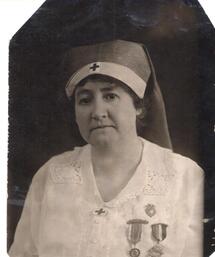
Marguerite Reusch (1870-1943): Genealogist, Artist, Red Cross Worker
Marguerite Reusch was born and raised in Fort Wayne, Indiana, but came to Petoskey shortly after her marriage to Frederick Reusch in 1900. She spent the rest of her life here participating in social causes and women’s organizations.
Marguerite’s interest in genealogy led to her involvement in the Daughters of the American Revolution (D.A.R.); and, she became the organizing regent for the Pe-to-se-ga Chapter in Petoskey. She helped members research their family history. Throughout her life, she remained a leader in the local chapter and beyond. Her obituary states that she was widely known as a genealogist not only serving the local chapter, but she also “aided many other chapters” in this research work.
An exceptionally talented artist, Marguerite often taught art lessons at the Petoskey schools or privately to interested persons. Some of her work remains at the family business, Reusch Jewelers in Petoskey.
For many years, Marguerite was a leader in the Red Cross, and was especially active during World War I. As well, she was a member the First Presbyterian Church in Petoskey and active in many women’s associations including the Emmet County Suffrage Association.
Marguerite Reusch was born and raised in Fort Wayne, Indiana, but came to Petoskey shortly after her marriage to Frederick Reusch in 1900. She spent the rest of her life here participating in social causes and women’s organizations.
Marguerite’s interest in genealogy led to her involvement in the Daughters of the American Revolution (D.A.R.); and, she became the organizing regent for the Pe-to-se-ga Chapter in Petoskey. She helped members research their family history. Throughout her life, she remained a leader in the local chapter and beyond. Her obituary states that she was widely known as a genealogist not only serving the local chapter, but she also “aided many other chapters” in this research work.
An exceptionally talented artist, Marguerite often taught art lessons at the Petoskey schools or privately to interested persons. Some of her work remains at the family business, Reusch Jewelers in Petoskey.
For many years, Marguerite was a leader in the Red Cross, and was especially active during World War I. As well, she was a member the First Presbyterian Church in Petoskey and active in many women’s associations including the Emmet County Suffrage Association.
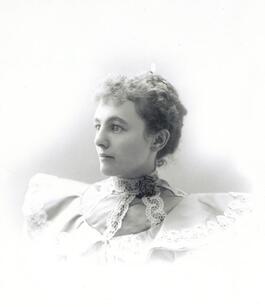
Minnie Rosenthal (1868-1943): Community Leader
Wilhelmina “Minnie” von Wunderlich was born in Fairfield, Maine in 1868 when her parents were in the United States on business, and soon after they returned to Germany. In the mid 1880’s Henrietta von Wunderlich left Hamburg, Germany with her two daughters, Minnie, and her younger sister, Zilla, and moved to Chicago. It was there that Minnie met Alick Rosenthal. Minnie and Alick married in Petoskey in 1887. The couple came to Petoskey from Charlevoix in 1894 where Alick worked with his father and his brother in their department store S. Rosenthal and Sons. Mr. Rosenthal and his brother and father were pioneer local merchants in Petoskey dating back to 1879. After Alick’s death in 1939, Minnie served as president of S. Rosenthal & Sons until the time of her death.
The Temple B’Nai Israel in Petoskey was founded in 1896 by a growing Jewish community. Minnie started a Sunday School for the children and Sister Organization for the women to help support the Temple. Minnie served as president of the Petoskey Temple Sisterhood. She presided over the Sisterhood locally and was also active in the organization statewide. Minnie became an honorary and past president of the Michigan State Temple Sisterhood. She was the second to serve in this capacity as State President.
In other areas of the community, Minnie was involved in the Federation of Women’s Clubs, and a charter member of the Petoskey Women’s Club. Minnie and her younger sister, Zilla Goldstein, were active members of the Emmet County Suffrage Association. The June 6, 1916 Petoskey Evening News reported that the two sisters had traveled to Chicago to “the National Suffrage Convention there tomorrow.”
Minnie and her sister were active in the Lockwood Hospital Auxiliary as well. The Rosenthal family donated a room to the hospital in memory of Alick’s mother; and, Minnie and her younger sister sewed the layettes for the maternity ward.
Minnie was known by her family as the “consummate lady.” She and her husband, Alick, built their home on Michigan Street in Petoskey.
Wilhelmina “Minnie” von Wunderlich was born in Fairfield, Maine in 1868 when her parents were in the United States on business, and soon after they returned to Germany. In the mid 1880’s Henrietta von Wunderlich left Hamburg, Germany with her two daughters, Minnie, and her younger sister, Zilla, and moved to Chicago. It was there that Minnie met Alick Rosenthal. Minnie and Alick married in Petoskey in 1887. The couple came to Petoskey from Charlevoix in 1894 where Alick worked with his father and his brother in their department store S. Rosenthal and Sons. Mr. Rosenthal and his brother and father were pioneer local merchants in Petoskey dating back to 1879. After Alick’s death in 1939, Minnie served as president of S. Rosenthal & Sons until the time of her death.
The Temple B’Nai Israel in Petoskey was founded in 1896 by a growing Jewish community. Minnie started a Sunday School for the children and Sister Organization for the women to help support the Temple. Minnie served as president of the Petoskey Temple Sisterhood. She presided over the Sisterhood locally and was also active in the organization statewide. Minnie became an honorary and past president of the Michigan State Temple Sisterhood. She was the second to serve in this capacity as State President.
In other areas of the community, Minnie was involved in the Federation of Women’s Clubs, and a charter member of the Petoskey Women’s Club. Minnie and her younger sister, Zilla Goldstein, were active members of the Emmet County Suffrage Association. The June 6, 1916 Petoskey Evening News reported that the two sisters had traveled to Chicago to “the National Suffrage Convention there tomorrow.”
Minnie and her sister were active in the Lockwood Hospital Auxiliary as well. The Rosenthal family donated a room to the hospital in memory of Alick’s mother; and, Minnie and her younger sister sewed the layettes for the maternity ward.
Minnie was known by her family as the “consummate lady.” She and her husband, Alick, built their home on Michigan Street in Petoskey.
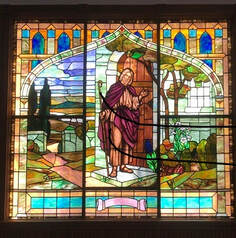
Edith Doe Sly (1869-1925): Active in Church Work and Red Cross
Throughout their thousand-year history, the purpose of stained-glass windows in churches was to inform the viewer through narrative or symbolism. The First Presbyterian Church in downtown Petoskey has several beautiful stained-glass windows which fulfill this purpose. The message of this window is the giving of service to others. Illuminated by natural light, this exquisite pictorial was given by the Women’s Organization of this church in memory of Edith Doe Sly who exemplified this message throughout her life.
Edith was a social worker and an active leader in the work of the Petoskey Presbyterian Church. In World War I, she served in the Red Cross and participated in other areas of war work. She continued her volunteer work in numerous clubs in the Petoskey community including the Emmet County Equal Suffrage Association. For some years during the winter months, her home was located on Bay Street and, then, later in her life, her home was on Division Street. She lived at the Sly home in Bay Shore during the summer months.
Throughout their thousand-year history, the purpose of stained-glass windows in churches was to inform the viewer through narrative or symbolism. The First Presbyterian Church in downtown Petoskey has several beautiful stained-glass windows which fulfill this purpose. The message of this window is the giving of service to others. Illuminated by natural light, this exquisite pictorial was given by the Women’s Organization of this church in memory of Edith Doe Sly who exemplified this message throughout her life.
Edith was a social worker and an active leader in the work of the Petoskey Presbyterian Church. In World War I, she served in the Red Cross and participated in other areas of war work. She continued her volunteer work in numerous clubs in the Petoskey community including the Emmet County Equal Suffrage Association. For some years during the winter months, her home was located on Bay Street and, then, later in her life, her home was on Division Street. She lived at the Sly home in Bay Shore during the summer months.
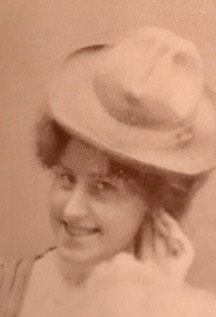
Lulu Pratt Sweeny (1887-1927): Active in Church, Community, and Fraternal Orders
Lulu Pratt Sweeny came from Genesee County to Petoskey with her parents as a young child. From her youth to womanhood, she was an active member in the Methodist Episcopal Church and Sunday School, and graduated from Petoskey High School. She was involved in various Petoskey fraternal orders: Queen Esther Shrine No. 15, W.S. of J., Beulah Chapter No. 63 Order of the Eastern Star, and Emmet Rebekah Lodge, No. 104. These fraternal orders were quite active during this time in our history and some remain active today.
Church and fraternal orders were not the only organizations that kept Lulu busy. In 1917, she was Secretary of the Petoskey Federated Women’s Clubs. In addition, she was active in the Emmet County Equal Suffrage Association during its existence; and, at some point during that time, she served as Vice-President.
While community involvement and leadership skills are evident in Lulu’s participation in these different organizations, the obituary includes a statement informing readers about her personal charm: “Her lovable disposition and pleasing personality won for her a host of friends.”
Lulu lived on Division Street in Petoskey.
Lulu Pratt Sweeny came from Genesee County to Petoskey with her parents as a young child. From her youth to womanhood, she was an active member in the Methodist Episcopal Church and Sunday School, and graduated from Petoskey High School. She was involved in various Petoskey fraternal orders: Queen Esther Shrine No. 15, W.S. of J., Beulah Chapter No. 63 Order of the Eastern Star, and Emmet Rebekah Lodge, No. 104. These fraternal orders were quite active during this time in our history and some remain active today.
Church and fraternal orders were not the only organizations that kept Lulu busy. In 1917, she was Secretary of the Petoskey Federated Women’s Clubs. In addition, she was active in the Emmet County Equal Suffrage Association during its existence; and, at some point during that time, she served as Vice-President.
While community involvement and leadership skills are evident in Lulu’s participation in these different organizations, the obituary includes a statement informing readers about her personal charm: “Her lovable disposition and pleasing personality won for her a host of friends.”
Lulu lived on Division Street in Petoskey.
